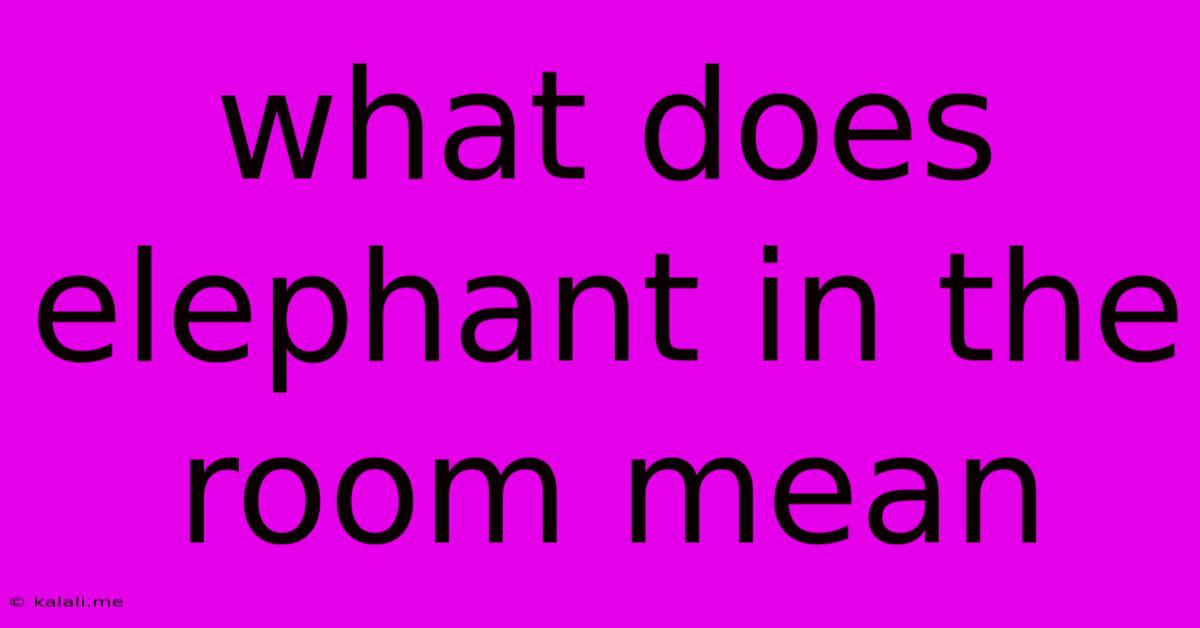What Does Elephant In The Room Mean
Kalali
Jun 06, 2025 · 3 min read

Table of Contents
What Does "Elephant in the Room" Mean? A Comprehensive Guide
The phrase "elephant in the room" is a common idiom used to describe a significant, obvious problem or issue that is being deliberately ignored or avoided by a group of people. It's a powerful metaphor that highlights the absurdity of pretending something isn't there, even when it's plainly visible. This article will delve deeper into the meaning, origin, and usage of this impactful expression.
Understanding the Metaphor:
Imagine a large elephant standing in the middle of a room. It's impossible to miss; it's overwhelmingly present and impossible to ignore. Yet, everyone in the room acts as if it isn't there, continuing their conversations and activities as if nothing unusual is happening. This is precisely the essence of the "elephant in the room." The elephant represents a glaring issue – perhaps a conflict, a difficult decision, or a sensitive topic – that everyone is consciously choosing to avoid addressing directly.
Origin and History:
While the exact origin of the phrase is difficult to pinpoint, its usage became more prevalent in the late 20th century. Some sources suggest the idiom's popularity may be linked to the growing awareness of social and political issues that were often ignored or downplayed. The metaphorical weight of an enormous elephant perfectly captured the uncomfortable reality of these unspoken truths. The impact of the metaphor lies in its visual simplicity and immediate understanding. Everyone understands what it means to have something large and obvious that everyone is pretending not to see.
How "Elephant in the Room" is Used:
This idiom is versatile and can be applied to various contexts, from personal relationships to large-scale societal issues. Here are some examples:
- Workplace Conflicts: A persistent disagreement between colleagues that's affecting team morale but isn't being addressed openly.
- Family Dynamics: A strained relationship between family members that is causing tension but is avoided during family gatherings.
- Political Discourse: A crucial social or economic issue that is being neglected by policymakers.
- Personal Relationships: A significant issue in a relationship, like infidelity or financial problems, which is being swept under the rug.
Synonyms and Related Phrases:
While "elephant in the room" is the most commonly used phrase, several alternatives capture a similar meaning:
- Unspoken truth: This phrase directly points to the fact that the issue is unacknowledged.
- The 800-pound gorilla: This emphasizes the sheer size and dominance of the problem.
- Open secret: This implies that everyone is aware of the issue, even if it's not openly discussed.
- Ignoring the obvious: This highlights the deliberate act of avoidance.
Addressing the Elephant:
Often, the most challenging aspect of the "elephant in the room" is acknowledging its existence. Once the problem is recognized and openly discussed, it becomes much easier to find solutions and move forward. Effective communication and a willingness to confront uncomfortable truths are key to resolving the "elephant" and creating a healthier, more productive environment.
In conclusion, the "elephant in the room" is more than just a quirky idiom; it's a powerful metaphor that speaks to the human tendency to avoid difficult conversations and confrontational issues. Understanding its meaning helps us recognize these situations, fostering a more honest and productive approach to problem-solving in all areas of our lives.
Latest Posts
Latest Posts
-
Mac Fix Or Merge Mp4 Files
Jun 07, 2025
-
R Change A Matrix Columns And Rows
Jun 07, 2025
-
Non Inverting Vs Inverting Op Amp
Jun 07, 2025
-
Fallout 4 Dogmeat Sanctuary Hills Location
Jun 07, 2025
-
Baptism Of The Holy Spirit Verses
Jun 07, 2025
Related Post
Thank you for visiting our website which covers about What Does Elephant In The Room Mean . We hope the information provided has been useful to you. Feel free to contact us if you have any questions or need further assistance. See you next time and don't miss to bookmark.